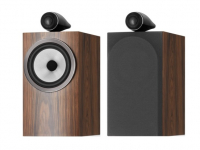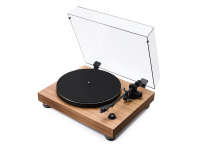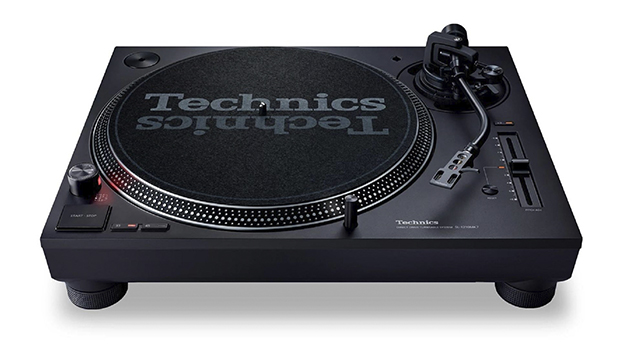
The announcement of the latest Technics’ 1210 lineage, the 1210MK7 marks the 40th anniversary of the legendary 1210 MK2’s release, which revolutionised DJ booths world wide with the innovation of the pitch fader.
Since its release in 1979, Technics had continued to design new and improved turntable models up until 2008. This year, Technics unveiled its most affordable turntable yet aiming to appeal to users who it had missed with the brand’s more audiophile-leaning and those looking to upgrade from previous favourites. The MK7 faces stiff competition in today’s marketplace as it faces off against other high torque direct drive manufacturers such as Audio Technica, Reloop and Pioneer. Prior to the MK7s release consumers who desired the high quality, reliable build and name of a Technics turntable might have turned to pre-loved models and perhaps had not considered the future investment. Servicing heritage models comes at a cost, as does the modification of turntables which can depreciate its value. So could the MK7 be the answer to these problems?
Unboxing the 1210 MK7 still has the look, feel and excitement of previous models. Opening the box users will glance upon the platter and immediately want to assemble the turntable, while the aesthetics of the matte black finish will appeal to a more contemporary DJ market. The sleek modern appearance has not only been designed for its style but to minimise distortion caused by vibrations, ideal for environments such as club DJing. As well as considerations to the finish, the popular modification of lights has also been addressed with users now able to switch between red and blue LED lighting (An option accessible from under the platter).
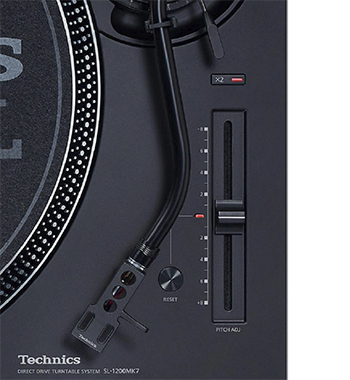 The MK7 has the capability of performing all the features you would expect to find on previous models with a few new additions.
The MK7 has the capability of performing all the features you would expect to find on previous models with a few new additions.
In the modern world of DJing, users will be happy to know that the pitch fader pushes the +/- 8% standard pitch to +/-16% which was first introduced by the 1210M5G. The +/-16% pitch assists users in reaching boundaries of tempo and genre was limited by legacy models. The pitch lock is similar to that of recent models, featuring the reset button which locks the pitch at 0%. It is advantageous to use the reset button as there is no locking mechanism to rest the fader at the original tempo such as in the design of the original MK2. Although it should be noted that the exclusion of a traditional pitch lock could benefit users long term regarding wear and tear. As part of the new design users can now play records in reverse unlocking hidden messages of songs such as ELO’s – Fire on high. This feature is accessed by a multifunction similar to the one used to adjust the RPM from its traditional 33 and 45 setting to 78.
One feature that sets the MK7 apart from its competition is the adjustable torque, something which could make a big difference to DJ’s, this feature is perfect for DJs with multiple styles who want to switch between mixing and scratching and those who simply wish to adjust a torque to their personal preference. A final consideration which DJs and Audiophiles will welcome are the detachable interconnects and power supply, as well as the ease of use and maintenance of detachable cabling, enthusiasts will know the difference these cables can make and Richer Sounds employees can help to advise and suggest improvements to the stock RCA cables.
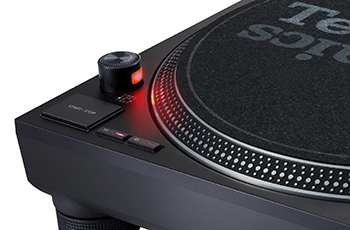 To demonstrate the MK7 it was paired alongside Reloop’s RP7000 turntable and Allen and Heath’s Xone 92 mixer, using Fyne Audio’s 501 floorstanding speakers through the Cambridge Audio Edge system and the use of Ortofon Concorde cartridges. As a user of 1210 MK2s and Reloops RP7000, the RP7000 was chosen for the ease of use to transport and a more recent release side by side comparison. The first noticeable difference between the MK7s and MK2s was the difference in weight, the MK7 was much lighter in weight similar to that of the RP7000. However the lighter design of the MK7 should not be snubbed at as DJs in recent years have looked towards lighter models for transport and have not seen a great difference in performance. Setting up of the MK7 was simple to do with a responsive anti-skate and balanced tone arm. Both turntables had a very desirable high torque motor for cueing records however the MK7 stood out for its stability and accuracy in adjusting pitch. The quality of sound outputted through the MK7 outperformed the RP7000 which should also be expected for MK2 users who are limited by internally wired connections.
To demonstrate the MK7 it was paired alongside Reloop’s RP7000 turntable and Allen and Heath’s Xone 92 mixer, using Fyne Audio’s 501 floorstanding speakers through the Cambridge Audio Edge system and the use of Ortofon Concorde cartridges. As a user of 1210 MK2s and Reloops RP7000, the RP7000 was chosen for the ease of use to transport and a more recent release side by side comparison. The first noticeable difference between the MK7s and MK2s was the difference in weight, the MK7 was much lighter in weight similar to that of the RP7000. However the lighter design of the MK7 should not be snubbed at as DJs in recent years have looked towards lighter models for transport and have not seen a great difference in performance. Setting up of the MK7 was simple to do with a responsive anti-skate and balanced tone arm. Both turntables had a very desirable high torque motor for cueing records however the MK7 stood out for its stability and accuracy in adjusting pitch. The quality of sound outputted through the MK7 outperformed the RP7000 which should also be expected for MK2 users who are limited by internally wired connections.
While Technics faces tough competition, the MK7 is a premium turntable that offers excellent value for money and still leads the way for direct drive DJ turntables. The functionality of greater pitch adjustment, solid build quality and detachable interconnects are some serious benefits which will improve the audio quality and usability of the deck. To get hands on and see the difference call your local Richer Sounds store to arrange a demo, and our colleagues can assist you with the setup of tonearms, anti-skate controls and show you the difference that interconnects can make.
Click here to learn more about the SL1210MK7 turntable
Author: James, Prestwich store




